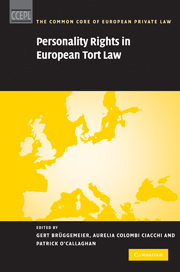Book contents
- Frontmatter
- Contents
- List of contributors
- National reporters
- General editors' preface
- Preface
- Editorial note
- List of abbreviations
- Part I Mapping the legal landscape
- 1 General introduction
- 2 Protection of personality rights in the law of delict/torts in Europe: mapping out paradigms
- 3 American tort law and the right to privacy
- Part II Case studies
- Part III A common core of personality protection
- Index
2 - Protection of personality rights in the law of delict/torts in Europe: mapping out paradigms
from Part I - Mapping the legal landscape
Published online by Cambridge University Press: 06 July 2010
- Frontmatter
- Contents
- List of contributors
- National reporters
- General editors' preface
- Preface
- Editorial note
- List of abbreviations
- Part I Mapping the legal landscape
- 1 General introduction
- 2 Protection of personality rights in the law of delict/torts in Europe: mapping out paradigms
- 3 American tort law and the right to privacy
- Part II Case studies
- Part III A common core of personality protection
- Index
Summary
Introduction
‘Personality Rights in European Tort Law’: What exactly are we talking about here? Both the term personality right and the term European tort law are misleading and need clarification right from the outset.
There is actually no such thing as ‘European tort law’. The ‘pigeonhole’ approach of individual torts is a particularity of the common law tradition, which finds no counterpart in the civil law. The term ‘law of delict’ is well-established with regard to the civil law systems, which claim ‘non-contractual liability for damage caused to another’, based on the general principle of neminem laedere.
As for the notion of ‘personality right’, in modern civil law there are two clear-cut notions of ‘rights’: public law recognises fundamental rights, be they classic human rights declaring the freedom of citizens from state intervention or be they social or economic rights requesting assistance and performances for citizens from public authorities. These are ‘innate’ and inalienable rights of human beings as such or of the citizens of the respective political entity, and are mostly enshrined in written constitutions. Private law provides for subjective rights: (absolute) property rights in corporeal things or intellectual achievements and (relational) obligations (Forderungen), e.g. a creditor's right to claim money from a debtor. These subjective rights are, by definition, alienable, heritable and of monetary value. They constitute the assets of a person. Civil personality rights do not fit into this dichotomy.
- Type
- Chapter
- Information
- Personality Rights in European Tort Law , pp. 5 - 37Publisher: Cambridge University PressPrint publication year: 2010
- 4
- Cited by



